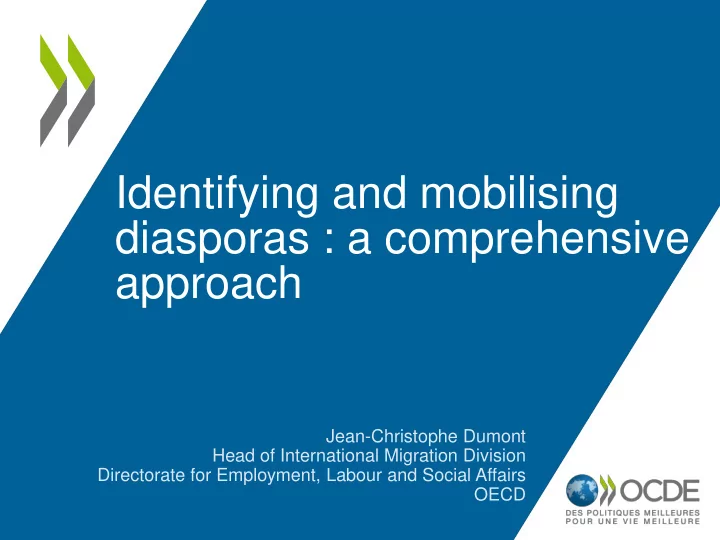

Identifying and mobilising diasporas : a comprehensive approach Jean-Christophe Dumont Head of International Migration Division Directorate for Employment, Labour and Social Affairs OECD
2 new publications on Migrants and Diasporas
Theoretical and practicable definition of Diasporas
140 country notes on migrants and their children
A Global Profile of Diasporas • Rapid changes in migration flows and stocks o Diversification of countries of origin and destination o More highly skilled migrants and foreign students Migrants and native-born children of migrants by o More (highly skilled) origin in OECD countries, 15 years old and over, 2008 migrant women Nearly 4 million o More native-born One third women with children of migrants (>5 million) higher education of all recent degrees settled in migrants are OECD countries tertiary- between educated 2000/2001 and 2005/2006 …
A Global Profile of Diasporas • Rapid changes in migration flows and stocks • Importance of migrants’ skills Distribution of the migrants by education level according to the region of origin and destination, 2005/2006
A Global Profile of Diasporas • Rapid changes in migration flows and stocks • Importance of migrants’ skills • Magnitude of the brain drain Sub-Saharan and brain waste Africa has the highest Emigration rates of the highly skilled by origin country, 2005/06 emigration rates of the highly educated (13.3%)
A Global Profile of Diasporas • Rapid changes in migration flows and stocks • Importance of migrants’ skills • Magnitude of the brain drain and brain waste • Desire to emigrate
Policy options to harness the skills of diasporas to foster development (1/2) • Better identify the potential and better understand the needs and aspirations of migrants and diasporas • Acknowledge the role of migrants as actors of economic and social changes while recognising that it also hinges crucially on the economic, social and political conditions prevailing in their home countries, as well as the support provided to expatriate communities. • Make a clearer distinction between policies aiming at (i) facilitating international mobility of skills and (ii) those aiming at mobilising the skills of the Diaspora
Policy options to harness the skills of diasporas to foster development (2/2) Bolstering co- Facilitating skill Mobilising operation and co- Data and analysis transfers and diasporas’ skills ordination amongst mobility stakeholders Reinforce Pursue efforts to Acknowledge the Facilitate exchange decentralised collect statistics on contributions of of information co-operation and the skills of migrants in host- regarding labour promote interactions needs, both at home migrants and and home-country between different and abroad diasporas societies levels of intervention Better understand Support Identify and the determinants Get employers development- eliminate obstacles of migrants’ oriented initiatives involved more engagement with for return of migrants’ directly their country migration associations of origin Improve the Promote new assessment and technological recognition of means to facilitate qualifications the exchange of and skills information Refocus pre-departure training programmes and re-integration programmes to suit requirements
11/11 Thank you for your attention For further information: www.oecd.org/migration http://www.oecd.org/migration/internationalmigrationpolicies anddata/economicaspectsofmigration.htm
Recommend
More recommend